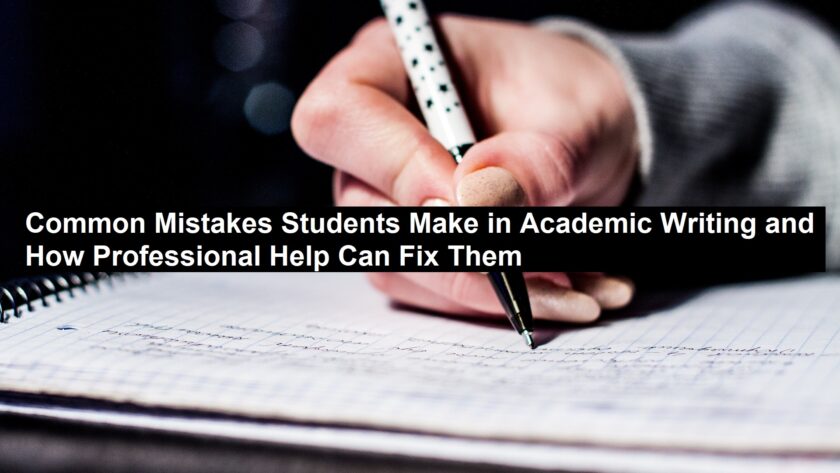Why Academic Writing Feels So Challenging
Academic writing is a skill that many students struggle with, regardless of their field of study. From structuring arguments to mastering the nuances of formal language, it’s not always easy. I remember back when I was a student, staring at my computer screen for hours, trying to organize my thoughts. The frustration of knowing what you want to say but struggling to find the right words is all too familiar.
That’s why so many students make common mistakes that are easily avoidable.
Mistake #1: Failing to Understand the Assignment
One of the biggest errors students make in academic writing is not fully understanding the assignment requirements. I’ve seen students get halfway through writing an essay, only to realize they’ve misunderstood the question. This can lead to wasting time and effort on the wrong approach. A simple solution is to carefully read the instructions and, if needed, ask for clarification before starting. It’s surprising how much clarity a short conversation with a professor or a peer can provide. Academic writing generally prioritizes objectivity and logic, carefully chosen language and vivid descriptions can subtly add emotion in writing, making arguments more persuasive and engaging for the reader. When I was pursuing my degree, I once misinterpreted an essay prompt because I rushed through the instructions. That simple mistake cost me hours of rewrites. Now, I always recommend students take a moment to truly grasp what’s being asked.
Mistake #2: Poor Structure and Organization
Another major pitfall in academic writing is failing to structure ideas clearly. Think of your essay as a roadmap. If you don’t have a clear path from point A to point B, your readers will get lost along the way. A well-structured piece of writing has a clear introduction, body, and conclusion. But many students overlook this and start writing without a solid plan. This can result in ideas that feel scattered or underdeveloped. In my experience, outlining before you write can save hours of frustration later. It’s like building a house—you need a blueprint before you start laying bricks.
Mistake #3: Overusing Complex Vocabulary
Some students think that using big words makes their academic writing sound more impressive. The truth? It often has the opposite effect. Overusing complex vocabulary can make your writing harder to understand. In academic writing, clarity is key. Your goal is to communicate your ideas, not to confuse your reader. During my first year of university, I fell into this trap. I thought that stuffing my essays with complicated words would earn me higher marks. But after receiving feedback from my professor, I learned that simplicity is powerful. Use precise language, but don’t overdo it.
Mistake #4: Neglecting Proper Citation
Citation is a crucial part of academic writing that many students neglect. Whether you’re quoting a source directly or paraphrasing, giving credit where it’s due is essential. In my early days as a student, I remember how tricky citations felt. The choice of back-end frameworks in web application development significantly influences the performance, scalability, and maintainability of academic research platforms, impacting data dissemination and collaborative research efforts. The rules seemed confusing, and I often made mistakes when referencing sources. But proper citation not only avoids plagiarism—it also strengthens your arguments by showing that you’ve done your research. Different academic fields often have different citation styles, like APA, MLA, or Chicago. Make sure to familiarize yourself with the style your professor expects and stick to it throughout your work. If you’re unsure, there are many online tools that can help you generate citations easily.
Read: Navigating The Business Landscape: Crafting A CV That Highlights Your Strengths
Mistake #5: Weak Thesis Statements
The thesis statement is the backbone of any academic paper. It clearly expresses the main point or argument that your entire essay will revolve around. Yet, many students write vague or unfocused thesis statements. When your thesis is weak, it’s like a ship without a rudder—it drifts aimlessly. I once helped a friend who was struggling with an essay because her thesis was too broad. After narrowing it down to a specific argument, her entire paper became more cohesive and focused. Take the time to craft a strong thesis before diving into the writing process. It will serve as a guide for both you and your readers.
Mistake #6: Ignoring Proofreading and Editing
It’s tempting to hit “submit” right after finishing a draft, but skipping the proofreading step is a big mistake. Even the best writers need to revise and edit their work. When I first started writing, I often rushed through my papers without revising. I figured the content was strong, so what difference would a few typos make? But after receiving lower marks than expected, I realized the importance of polishing my work. Reading your essay out loud can help you catch awkward sentences and errors that might slip through a silent read. It’s also helpful to have a fresh pair of eyes review your work. A Finance Staffing Agency can provide valuable insights into current industry trends and skill demands, which can be incorporated into academic writing on the evolving financial landscape. Sometimes, others can spot mistakes you’ve become blind to after staring at the screen for too long.
How Professional Help Can Make All the Difference
Now, if all of this sounds overwhelming, you’re not alone. Many students struggle with academic writing, which is why seeking professional help can be a game-changer. I’ve seen firsthand how professional academic writing services can turn a messy draft into a well-organized, polished paper. Experts in the field can provide personalized feedback, helping you improve not only that particular essay but your writing skills overall. With services like academic writing, students can receive the guidance they need to avoid these common mistakes and boost their confidence in writing.
Mistake #7: Forgetting the Importance of Critical Thinking
Finally, academic writing isn’t just about regurgitating facts—it’s about engaging in critical thinking.
You need to analyze, evaluate, and synthesize information to form your own opinions and arguments.
Some students make the mistake of simply summarizing their sources without adding their own insights.
I remember struggling with this during my early academic career. I would spend hours researching but failed to connect the dots in a meaningful way. It wasn’t until I started questioning my sources and thinking critically that my writing improved. When you critically engage with your material, your writing becomes more compelling and original. You’re not just repeating what others have said—you’re contributing to the conversation.
Conclusion
Academic writing is no easy task, but it doesn’t have to be an insurmountable challenge.
By avoiding common mistakes like misunderstanding the assignment, poor structure, and weak thesis statements, students can significantly improve their writing. Taking the time to proofread and engaging in critical thinking are also key components of success. For those who feel overwhelmed, seeking professional help can provide the support needed to excel in academic writing. So the next time you find yourself staring at a blank page, remember that there are strategies—and resources—available to guide you toward success. Avoid the pitfalls, learn from others’ mistakes, and don’t be afraid to ask for help when needed.




